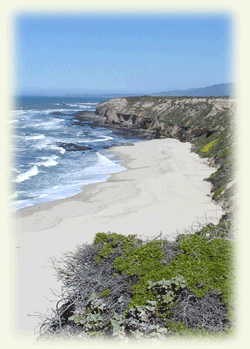|
 News News
 Subscribe to Our Newsletter Subscribe to Our Newsletter
 Sign up for Email Updates
Sign up for Email Updates
 CGF In the News
CGF In the News
 Press Inquiries Press Inquiries
 Past Articles Past Articles
 Calendar Calendar
|
|
|
Coastal open space --
one step at a time!
by Lennie Roberts
The long-awaited expansion of Midpeninsula Regional Open Space District
(MROSD) to include the San Mateo coast is moving forward - despite a concerted effort by a handful of south coast landowners to thwart it.
Where the annexation process stands
The District initiated the
coastal annexation process at the request of the Mid-Coast Community Council, the Pescadero Municipal Advisory Council, and the
Half Moon Bay City Council.
So far, the process has far exceeded the legal requirements; indeed, the District may have achieved a first in California by
preparing an EIR on protecting coastal open space!
To date the District has
• Held an advisory vote of the area to be annexed
• Held a year-long series of Citizens' Advisory group meetings, chaired by
Supervisor Rich Gordon
• Adopted a Service Area Plan
• Circulated a Draft Environmental Impact Report
 Measure F, the advisory vote on the expansion of the District, passed handily back in 1998 due to strong support from the Mid-Coast and Half Moon Bay area. In the
South Coast, however, the measure did not pass - largely due to a misleading campaign of scare tactics, including threats that the District would take people's homes. Measure F, the advisory vote on the expansion of the District, passed handily back in 1998 due to strong support from the Mid-Coast and Half Moon Bay area. In the
South Coast, however, the measure did not pass - largely due to a misleading campaign of scare tactics, including threats that the District would take people's homes.
Because the District's
potential use of eminent domain was so threatening on the south coast, coastal environmental leaders obtained pledges from many landowners that they would support the annexation if MROSD
would drop eminent domain. The District Board subsequently adopted a permanent policy of Willing Sellers Only and eliminated their powers of eminent domain throughout the coastal annexation area.
An end-run by the new PMAC
But over the past summer, it became evident that many landowners were not honoring their pledges. The Pescadero Municipal Advisory Council (PMAC), representing 800 voters in
the South Coast, now has some of the most ardent opponents of the District on its board. Some of these opponents had signed the pledge, but are now opposing the annexation.
In August, the PMAC voted to ask the Board of Supervisors to hold a second advisory vote - only on the South Coast - for the sole purpose of emphasizing the opposition of the area to the
annexation. This mischief was defeated (as advocated by CGF) by a unanimous vote of the Board of Supervisors who recognized that a second vote would be contrary to the long cherished
principle in our country of "majority rule." Think of the chaos and unnecessary cost that would result if, in every election where a district dissented from the majority, a new vote were held simply
to highlight a district's minority view.
Where the controversy lies
It should be noted that most coast agricultural land is owned by absentee owners, who lease their land on a year-to-year basis
and have not encouraged long-term investment in the farming enterprise. And most of the controversy over annexation centers around how MROSD would establish policy regarding
agricultural lands acquired from willing sellers.
The District plans to adopt a set of policies that would address the issues involved in keeping agricultural land in production, while
providing for public trails in appropriate locations and protecting sensitive habitats such as streams and wetlands. This process would again involve local advisors.
Having your cake and eating it too
It's ironic that for many years landowners and developers have repeatedly trumpeted: "If you want to preserve open space, buy it!"
Now when faced with exactly that prospect - an agency devoted
to preserving open space is offering fair market value to willing sellers only - these same voices seem to be saying, "we already have enough open space; we would rather have more
development, thank you."
Unfortunately, where rural areas have not realized the value of preserving their scenic and economic rural land base, urban sprawl has changed those qualities forever.
Next steps
The next steps for annexation of the coast are for MROSD to complete the EIR process and submit an application to the Local Agency Formation Commissions (LAFCo) of both San Mateo
and Santa Clara Counties. LAFCo will then hold public hearings sometime next year, and make a decision on the annexation.
CGF will continue to work with the Coastal community and
MROSD to support the District's expansion, which offers the prospect of open space that will serve everyone.
Published October 2002 in Green Footnotes.
Page last updated November 4, 2002 |
|
![]()
![]()




